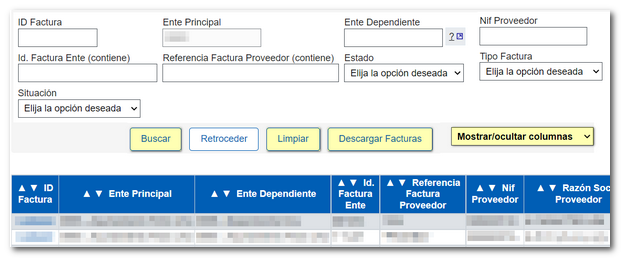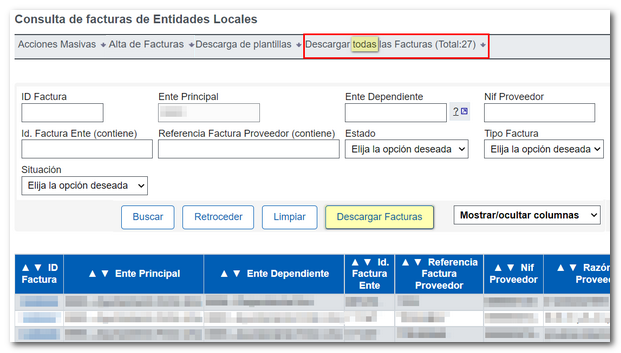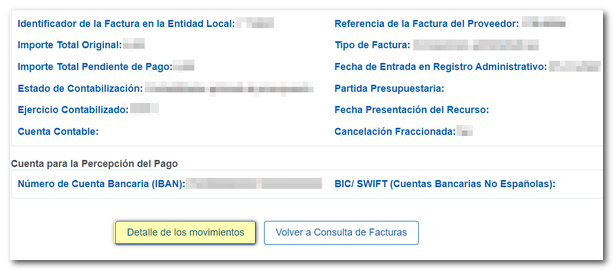Frequently asked questions for local authorities
Skip information indexConsultation of invoices
From option "Local Entity Invoice Query" Local Entities are allowed to both manage (submit invoices) and retrieve information from the data previously supplied to the supplier payment platform.
The query application allows you to filter your searches. It is recommended to use the option "Clean" before performing the first search to avoid retaining unwanted filtering from previous searches.

-
To access the "Invoice Details" you have to click on the field "Invoice ID" .
-
It is possible to configure which columns (what information) are displayed in the search results from the "Show/hide columns" options.
In addition, there is the possibility of exporting the invoices that meet the search conditions in a CSV file (which includes all the information on said invoices) from "Download Invoices" .
Through the invoice query, you can access the details of each invoice by clicking on the field "Invoice ID" .
Yes. From the link "Download all Invoices" located in the top menu of the invoice consultation screen. In this link, the entity will see the total number of invoices added to the platform.

It is also possible to download a file with the invoice data resulting from a search using the " Download Invoices " button, located next to the " Search " and " Clear " buttons.
From the button "Transaction details" all the statuses and situations that the invoice has gone through since it was registered are displayed.
It is located at the bottom of the details of each invoice (accessed from the invoice query).

There is no possibility of performing a mass query of the details of invoice movements.
Detailed consultation of transactions must be carried out individually, accessing each of the invoices whose history you wish to consult.
The invoice status is the internal value; It collects the possible values that an invoice can take during its processing process, from when it is incorporated into the platform until it is finally processed by the ICO. It is independent of the invoice status. The possible statuses of an invoice are:
-
Activate . Initially, all invoices that are added to the platform are in this status. In order to carry out any management or processing, an invoice must be in the "Active" status. Only invoices that are active can be sent to ICO .
-
Canceled . Local authorities may place an invoice in this status for any reason they deem appropriate: wrong invoice, duplicate invoice, etc. From this status, an invoice cannot be sent to the ICO .
-
Cancelled already paid . It is a particular case of the "Cancelled" status, but in which the exact reason why the invoice was cancelled is known.
-
Sent ICO . All invoices sent to ICO are in the status "Sent ICO ". Only invoices that are active and for which the supplier has clearly accepted payment of the invoice can be placed in the "Sent ICO " status.
-
Rejected ICO: Invoices sent to ICO may be rejected by this body for different reasons. And they will go to the "Rejected ICO " status.
The invoice status reflects the supplier's position on the invoice, indicating whether the invoice is pending acceptance by the supplier or whether the supplier has expressed acceptance.
The values that the situation may take are:
-
Pending acceptance . Situation in which the invoice is found when it has been incorporated into the system or when the supplier has determined the expressed acceptance of the invoice and in a subsequent step decides to cancel said acceptance.
-
Acceptance expressed. An invoice falls into this situation when a supplier, acting on its own behalf or through delegation to a local entity, expressly accepts payment of the invoice through this financing mechanism.